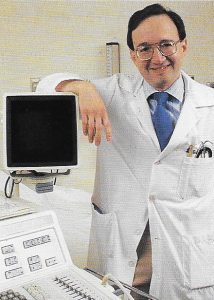In 1975, David Sacks, MD, began practicing at Kaiser Permanente in Bellflower, where he specialized in high-risk pregnancies. A few years later, he came across a patient who had a strange blood disorder. There was concern that she and her baby could die.
 He did everything he could, and his patient survived. He wrote up the case for the American Journal of Obstetrics and Gynecology. It was his first taste of research, and he couldn’t wait to get more.
He did everything he could, and his patient survived. He wrote up the case for the American Journal of Obstetrics and Gynecology. It was his first taste of research, and he couldn’t wait to get more.
Kaiser Permanente Southern California’s legacy of research aimed at improving health and health care began in the early 1950s. In the beginning, it was physicians like Dr. Sacks — the longest-serving Southern California Permanente Medical Group physician working on research today — who used what they were seeing in the clinic to power research for the broader world.
Now celebrating its 60th anniversary, the program conducts research used as evidence for national and international policymaking as well as many improvements to patient care.
“One of the things I learned early on was that the best research comes from trying to find the answer to some very simple questions,” Dr. Sacks said. “And we can rely on working with our patients to bring us those questions.”
Read on through the decades about this history of the Kaiser Permanente Southern California research program.





